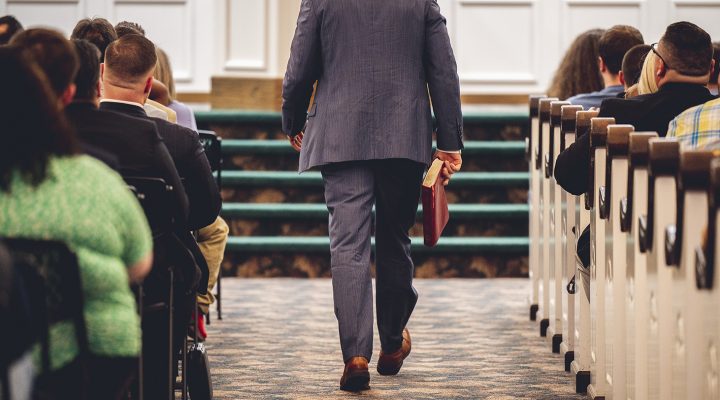Recently, I heard yet another story of a “centrist” Southern Baptist church calling a pastor who is inevitably going to steer the church sharply to the right. It doesn’t take a Ph.D. in theology to understand this.
It only takes a little bit of observation of what has happened and what is happening in American churches in general and the stealthy growth of Calvinism in Southern Baptist life over the past 30 years.

Mark Wingfield
Baptist churches that have not been steeped in fundamentalism or Calvinism may wrongly assume these theologies are less harmful than they typically are. Both represent toxic theologies that should be anathema to any Baptist church that cares about loving people and living out warm-hearted evangelism and ministry. And if your church cares a whit about social justice, double the warning.
Yes, this sounds alarmist. But it is truth that has been borne out across the land in church after church after church where pastor search committees have said, “Oh, but he’s got such good other qualities. Surely we can live with this.”
Fundamentalism and Calvinism are like Kudzu on Georgia trees. They take over their hosts and choke out what was healthy before. Both these theologies cannot abide sharing space or leadership with opposing views. They are know-it-all theologies that demand total allegiance.
Both Calvinists and fundamentalists may argue that they represent “historic” Southern Baptist positions, and they are partially right about that. They also represent theological positions Southern Baptists chose to move away from in the early 20th century. In the post-war era of rapid growth in churches, Southern Baptists led the way precisely because they moved away from fundamentalism and Calvinism.
“Both these theologies cannot abide sharing space or leadership with opposing views. They are know-it-all theologies that demand total allegiance.”
From 1925 to about 1990, Southern Baptists portrayed themselves as unified in missions and evangelism more than in precise theology. They left the fundamentalist mantle to independent Baptist churches and pastors like Jerry Falwell and his Thomas Road Baptist Church. But the conservative resurgence adopted the attitudes and techniques of fundamentalism and therefore opened the door to narrowminded invaders. Southern Baptists accentuated the “whosoever will may come” of the gospel and left behind the limited atonement of their Calvinist forebears. They left the Calvinist mantle to independent Baptist pastors like John MacArthur and his Grace Community Church. But with fellow Calvinists placed in SBC leadership positions, the warning sirens against this damning and damnable theology got silenced.
The so-called “conservative resurgence” that began in 1979 was about throwing the SBC back into its fundamentalist past, about negating the previous 50 years of cooperative ministry focused on mission more than lockstep theological belief. Out of that, Al Mohler’s election as president of Southern Baptist Theological Seminary put neo-Calvinism back on the map and gave it an indoctrination camp. For a while, conservative evangelicals in the SBC were concerned about that. Now, they just look the other way.
Paige Patterson, one of the co-architects of the conservative resurgence, squandered the opportunity to stamp out the resurgent interest in Calvinism by using his acrid and self-promoting personality to make Southwestern Baptist Theological Seminary less desirable for young ministers than Al Mohler and Southern Seminary.
Most Southern Baptist laypeople and even most Southern Baptist pastors couldn’t see what was happening around them. They thought the battle for the Bible was about inerrancy when it was, instead, about authoritarianism. To be clear, is is possible to be theologically conservative without being either a Calvinist or a fundamentalist.
Both fundamentalism and Calvinism require authoritarian leaders and uniform theology often expressed in creeds. It is no wonder some of the SBC seminaries now require faculty to affirm up to five statements of faith each year. The narrowness of their orthodoxy keeps getting smaller.
“Both fundamentalism and Calvinism require authoritarian leaders and uniform theology often expressed in creeds.”
And for more than 20 years, these narrow-minded seminaries have been putting out narrow-minded pastors who want to bring everything they learned to your traditional Southern Baptist church. But most pastor search committees cannot tell the difference.
For every Cooperative Baptist Fellowship or Alliance of Baptists church you can point to as moving to the left since 1980, I can point you to a dozen SBC churches that have moved much farther to the right because of the pastors they’ve called.
From 1979 to 2000, the SBC not only purged itself of liberals and moderates and progressives, it shifted its “center” to the far right. What passes as a centrist in today’s SBC used to be called a fundamentalist.
Again, most pastor search committees do not understand this reality. And churches with histories of cooperative and loving Baptist identities suddenly find themselves led by pastors who might as well be from another planet. This seldom goes well.
The church mentioned at the beginning of this article exemplifies those most at risk. It is a self-described “purple” church that includes a range of theological and political positions. Because of this diversity, the search committee struggled for months to find a candidate acceptable to all sides. Ultimately, the progressives on the committee yielded to the conservatives on what was billed as a compromise candidate — but this was no compromise. It brought to the church something far more than conservatism; it brought Calvinism.
These days, pastor search committees in Baptist churches must be wiser than ever. The credentials once thought to represent the kind of theology you are accustomed to hearing preached may not represent the same thing anymore. If you’re looking for a fundamentalist or a Calvinist, you’ve got plenty of men (and only men) to choose from. But if your church has been more centrist or mainstream evangelical, do your homework. Not all Southern Baptist-educated pastors believe the same things.
Buyer, beware.
Mark Wingfield serves as executive director and publisher of Baptist News Global. He is the author of Honestly: Telling the Truth About the Bible and Ourselves and Why Churches Need to Talk About Sexuality. His forthcoming book is Troubling the Truth and Other Tales from the News.
Related articles:
Dear Pastor Search Committee | Opinion by Anonymous
Finding a pastor today is nothing like it was 30 years ago, consultants caution
Why is there a growing trend toward elder governance in Southern Baptist churches? | Analysis by Rodney Kennedy


